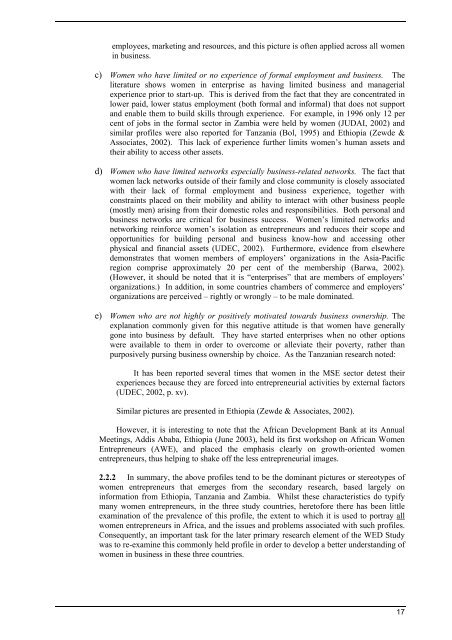The Challenges of Growing Small Businesses - International Labour ...
The Challenges of Growing Small Businesses - International Labour ...
The Challenges of Growing Small Businesses - International Labour ...
You also want an ePaper? Increase the reach of your titles
YUMPU automatically turns print PDFs into web optimized ePapers that Google loves.
employees, marketing and resources, and this picture is <strong>of</strong>ten applied across all women<br />
in business.<br />
c) Women who have limited or no experience <strong>of</strong> formal employment and business. <strong>The</strong><br />
literature shows women in enterprise as having limited business and managerial<br />
experience prior to start-up. This is derived from the fact that they are concentrated in<br />
lower paid, lower status employment (both formal and informal) that does not support<br />
and enable them to build skills through experience. For example, in 1996 only 12 per<br />
cent <strong>of</strong> jobs in the formal sector in Zambia were held by women (JUDAI, 2002) and<br />
similar pr<strong>of</strong>iles were also reported for Tanzania (Bol, 1995) and Ethiopia (Zewde &<br />
Associates, 2002). This lack <strong>of</strong> experience further limits women’s human assets and<br />
their ability to access other assets.<br />
d) Women who have limited networks especially business-related networks. <strong>The</strong> fact that<br />
women lack networks outside <strong>of</strong> their family and close community is closely associated<br />
with their lack <strong>of</strong> formal employment and business experience, together with<br />
constraints placed on their mobility and ability to interact with other business people<br />
(mostly men) arising from their domestic roles and responsibilities. Both personal and<br />
business networks are critical for business success. Women’s limited networks and<br />
networking reinforce women’s isolation as entrepreneurs and reduces their scope and<br />
opportunities for building personal and business know-how and accessing other<br />
physical and financial assets (UDEC, 2002). Furthermore, evidence from elsewhere<br />
demonstrates that women members <strong>of</strong> employers’ organizations in the Asia-Pacific<br />
region comprise approximately 20 per cent <strong>of</strong> the membership (Barwa, 2002).<br />
(However, it should be noted that it is “enterprises” that are members <strong>of</strong> employers’<br />
organizations.) In addition, in some countries chambers <strong>of</strong> commerce and employers’<br />
organizations are perceived – rightly or wrongly – to be male dominated.<br />
e) Women who are not highly or positively motivated towards business ownership. <strong>The</strong><br />
explanation commonly given for this negative attitude is that women have generally<br />
gone into business by default. <strong>The</strong>y have started enterprises when no other options<br />
were available to them in order to overcome or alleviate their poverty, rather than<br />
purposively pursing business ownership by choice. As the Tanzanian research noted:<br />
It has been reported several times that women in the MSE sector detest their<br />
experiences because they are forced into entrepreneurial activities by external factors<br />
(UDEC, 2002, p. xv).<br />
Similar pictures are presented in Ethiopia (Zewde & Associates, 2002).<br />
However, it is interesting to note that the African Development Bank at its Annual<br />
Meetings, Addis Ababa, Ethiopia (June 2003), held its first workshop on African Women<br />
Entrepreneurs (AWE), and placed the emphasis clearly on growth-oriented women<br />
entrepreneurs, thus helping to shake <strong>of</strong>f the less entrepreneurial images.<br />
2.2.2 In summary, the above pr<strong>of</strong>iles tend to be the dominant pictures or stereotypes <strong>of</strong><br />
women entrepreneurs that emerges from the secondary research, based largely on<br />
information from Ethiopia, Tanzania and Zambia. Whilst these characteristics do typify<br />
many women entrepreneurs, in the three study countries, heret<strong>of</strong>ore there has been little<br />
examination <strong>of</strong> the prevalence <strong>of</strong> this pr<strong>of</strong>ile, the extent to which it is used to portray all<br />
women entrepreneurs in Africa, and the issues and problems associated with such pr<strong>of</strong>iles.<br />
Consequently, an important task for the later primary research element <strong>of</strong> the WED Study<br />
was to re-examine this commonly held pr<strong>of</strong>ile in order to develop a better understanding <strong>of</strong><br />
women in business in these three countries.<br />
17
















